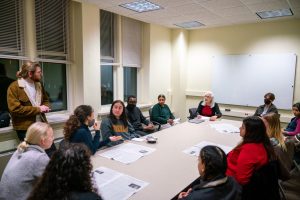Translation Symposium Stuns Monolingual Obies
April 15, 2011
Jed Deppman, head of the Comparative Literature department and organizer of Oberlin’s Ninth Annual Translation Symposium, introduced the symposium by declaring the act of translation as a “serious countercultural force.” On Thursday, April 7 in King 106, Deppman started the symposium by announcing that those present were attending the “best cultural and intellectual event we have at Oberlin,” and the hearty applause of the 70 gathered students and professors affirmed proved their agreement.
Sponsored by the Classics, Creative Writing and Comparative Literature departments, the symposium featured poems translated by two professors and 19 students. Culled from an open submission during first semester, the poems read during the Symposium were selected based on creativity and accuracy, with authors reading both their translations and the original works themselves.
Although the Symposium featured works in a total of 12 different languages, the majority of the poems read were translated from a foreign tongue to English. College senior Harmony Pringle, for instance, translated an anonymous Mozarabic poem to both modern Spanish and English, while College junior Olivia Combe translated the e. e. cummings poem “somewhere I have never travelled” into French. I was amazed by several poets who translated works between two languages, neither of which was the translator’s first tongue — further underscoring the cross-cultural significance of the act of translation.
Two poems read at the event were non-literal translations of the original works. For example, College senior Elin Rummel’s version of Ovid’s Amores 1.3 was not intended to be a word-for-word translation, instead aiming to elucidate the playful nature of the original poem. “This is a very liberal translation aimed at Ovid’s cheekiness,” Rummel explained about her poem, which prompted tittering and twittering from the mostly serious audience. “I made a lot of decisions, and some lines are purposely over the top.”
College senior Lauren Clark also took a non-literal approach to translating Catullus’ famous workCatullus 5. While Catullus 5 has been translated countless times in the past, Clark’s interpretation of the poem was thoroughly modern: the narrator of the poem referred to herself translating, and Clark provided a more literal English translation in conjunction with the original passage. The structure of Clark’s translation also didn’t match Ovid’s original meter, breaking up the single passage into three numbered parts and using enjambment to create a sense of urgency. Her translation seduced the original verse — a lover’s appeal to dismiss the scorn of others — and transformed it into a powerful meditation on death.
Although there was a four-minute limit on each reading, few poets followed the rule. Before or after reading each poem, the translators offered a few words to explain stylistic decisions, give historical context or describe what it was about the original work that compelled them to translate it. Since most poems were originally written in languages unfamiliar to the audience, the poet’s explanations allowed the audience to gain a more comprehensive understanding of the piece.
At one point during the event, College senior Alex Tamaki paused while reading his poem, his breathy voice exploring the lines and silences in his near-perfect translation of a haiku written by Japanese poet Kobayashi Issa. Although the poem had no overt political content, I still felt what Deppman had said about the cultural importance of translation: the piece, a scant 15 words, tiptoed the line between literal translation and translation of form, the words spilling down the page, as if the moment depicted in the poem itself was fleeting.

























